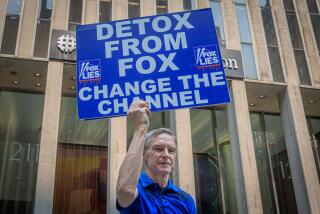A Chance for a Bill in the Public Interest : Bush should sign campaign reform law
- Share via
James R. Elliott is an ex-con who was imprisoned in the 1980s for bank fraud. Now president of Cherry Payment Systems, a Midwestern marketing company, Elliott is also among the co-chairmen of the “President’s Dinner,” the largest Republican fund-raising event of the year, held Tuesday evening.
So far, so innocent. If Elliott wants to go straight as a Republican, more power to him. The problem is that, according to reports first published in the Washington Post, Elliott plans to parlay gifts to his party into a pardon. “He was bragging about it,” an employee of Elliott’s reportedly said. “He said he was going to use his political connections . . . to have a pardon after the election.”
William P. Neiss, a former employee of Elliott’s, is suing him, charging that Elliott tried to force some of his employees to buy $1,500 tickets to the President’s Dinner. Neiss’ refusal led, he claims, to threats from Elliott, including a letter that said: “Let your wallet be your guide. Your (sic) either here for the long term or your on vacation.” When Neiss held out, he says, Elliott fired him.
A PROBLEM: According to election law, political action committees (PACs) are limited to $5,000 per candidate per election, while individuals are limited to just $1,000. Coercion apart, companies like Elliott’s may not contribute directly to candidates at all. Corporations and labor unions do, however, contribute millions to political candidates. One way they do it is by giving the money to the candidate’s political party, which launders it (removes the contributor’s name) and passes it on to the candidate. Another way is by bundling. Individuals, coerced or not, write the checks. A labor union or a corporation just bundles the checks and mails them in--and, of course, gets the political credit.
Bundling, even without coercion, clearly frustrates the intent of campaign law, and both of the major political parties officially oppose the practice. Both, unfortunately, also engage in it. President Bush, though rather more exercised over union bundlers than over corporate bundlers, also opposes it, but his opposition too stops at lip service.
A SOLUTION: Bush has vowed to veto a campaign reform bill, due to arrive shortly on his desk, that would criminalize bundling. He opposes the bill’s public funding of congressional campaigns, though presidential campaigns, including his own, have long been publicly funded. He also opposes its limits on campaign expenditures, saying they would favor incumbents.
About this, the President is clearly wrong. The current congressional system (no limits, no public funding) guarantees a huge fund-raising advantage to incumbents and has returned them to office 98% of the time. The current presidential system, by contrast (public funding, but no limits), has favored challengers in two of the last four elections.
It is troubling, to say the very least, to note that Elliott’s 1980s crimes were a part of the savings and loan debacle. We note with no pleasure that the S&L; scandal has reached all the way into the President’s immediate family. The last thing a Bush should want is the appearance of a compromising relationship with the likes of James R. Elliott.
President Bush’s opposition to the campaign reform bill is neither in his own political interest nor, notably, in the interests of Republican office seekers who need matching funds and campaign limits if they are to dislodge entrenched congressional Democrats. This bill may be as important a political reform as President Bush will see. It could free the country from blatant influence buyers and their dirty money. By opposing it, the President, whatever his intent, places loyalty to wealthy contributors above assistance to Republican as well as Democrat challengers. For the good of both parties and the great good of the country, he should sign this crucial reform into law.
More to Read
Get the L.A. Times Politics newsletter
Deeply reported insights into legislation, politics and policy from Sacramento, Washington and beyond. In your inbox twice per week.
You may occasionally receive promotional content from the Los Angeles Times.










